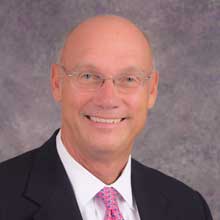Michael Ice is a senior finance lecturer at the University of Rhode Island’s College of Business Administration with more than 30 years of experience on Wall Street.
PBN: In your 30 years on Wall Street, were there any events or times you experienced that you find comparable to what’s happening with the stock market now? How are they alike or different?
ICE: Good question, but I would say in my 30 years, this is unprecedented. There is just so much that is unknown. The science and finance [worlds] meeting can be dangerous. The medical folks are working their tails off, but there is just so much they don’t know. We all like to model things, both science and finance, but we have little to go on and every day we just keep getting more bad news to try to synthesize.
We’re pretty certain we’re looking at negative [gross domestic product]. The [Federal Reserve] fired its bazooka and continues to fire whatever artillery they can; same with global central banks, but with minimum impact. I am pretty certain we’re in a recession, but for how long? Is there an end? And the public is being asked to do things they have never experienced. The market appears to be emotional. People are frightened. And nobody really knows where this ends.
PBN: What advice would you give to investors regarding actions to take (or not to take) amid the volatility in the global market?
ICE: I still hold to staying put. You missed your chance to sell. If you are a long-term investor and weather the pain, I say hold. I think the market is being driven by speculators, algorithmic, and index trading. There is emotion there, as well.
If and when this pandemic runs its course, and the economy goes back to work, I think structurally, we should be fine. Assuming COVID-19 runs its course or a vaccine is discovered, the economy should return. More bad news on the science side could, of course, change all that.
PBN: How do you anticipate this pandemic, in terms of stock market crashes, interest-rate cuts and a predicted economic slowdown, will impact banks?
ICE: As I said before, the financial institutions and banks are much better capitalized and regulated, and this time are not the cause of the problem. That said, they are certainly not immune and face significant challenges going forward.
The yield curve is flat and therefore the bank’s NIM – net interest margin or interest spread – is almost nothing. That is the traditional source for banks’ earnings.
Along with that, a bank has a moral obligation to the community. Many banks are acting as responsible citizens by extending loans to hard-hit borrowers, renegotiating credit terms, and even donating face masks to their clients.
Many challenges face the banks. For the most part, banks are less hit from a job-security standpoint. Still, there will be diminished hours, less tellers required and increased operational risks as they transform to stay-at-home, remote [workforces]. The regulators are providing some flexibility, but banks must remain hyper-vigilant. They need to also actively consider short- and medium-term financial risk, and regulatory compliance implications that result from the continuing uncertainty around COVID-19.
Liquidity has been a major concern with the Federal Reserve intervening in the repo market and the [European Central Bank, Bank of Japan and People’s Bank of China] taking actions. They must ensure liquidity across the enterprise.
The risk of credit has been there before the COVID-19 crisis and could only worsen. Half of the investment-grade bond market currently holds a BBB rating – the lowest possible investment-grade rating. As the economy struggles and contracts, this should only worsen.
PBN: What can banks do, if anything, to mitigate the losses to their profit margin due to falling interest rates and declining economic activity?
ICE: I would err on the side of survive to fight another day. Maybe it’s cliche, but the alternative is dangerous. Certainly, banks should explore alternative sources of income, but not as a result of taking more risks. This should pass. At some point, return to a more normal-term structure of interest rates. Don’t panic and weaken credit standards. Actually, spend your time doing vigilance on your current credit risk and make adjustments as needed.
Your clients and their financial health is likely weakening. Resist the temptation to get aggressive and increase risk to generate income. Grow your market share with increased service versus risks. Be creative and forward-thinking on ways to deliver your product in this new social-distancing paradigm. Focus on hyper-vigilance and ensure something catastrophic on your own doing doesn’t happen. The system needs financial institutions and banks, so be the one that comes out the other side in the best shape.
PBN: Some comparisons have been made between this crisis and the 2008 recession. Do you agree with those comparisons, and why or why not?
ICE: Of course you can draw some similarities to [the] ’08 market crisis, impaired asset values, high volatility, etc., but I think they are very different. Technical analysis is not my forte, so I can’t comment, but I expect there are similarities.
Banks or financial institutions are not the cause of the crisis. They suffer, for sure, with decreased NIM, falling asset prices, deteriorating credit due to halted economy, threatened liquidity and everything that goes with a depression. But the economy was in pretty good shape, slowing but sound. The ’08 economy was overinflated by a fictitious real estate bubble that burst. There were many structural issues that needed to be addressed. In this case, the issue is known: COVID-19. Unfortunately, we don’t yet know how really bad that is. Or how long this will last. At this point, I would say the market is trading to a worst-case scenario, which seems to get worse every day.
Nancy Lavin is a staff writer for PBN. Contact her at Lavin@PBN.com.












